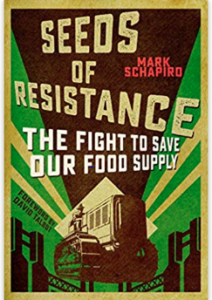I’m on the visionary panel. To register, click here.

Mark Schapiro. Seeds of Resistance: The Fight to Save Our Food Supply. Hot Books, 2018.

I never think much about seeds, but this book makes it clear that I and everyone else should be giving them a lot of thought. Our food supply depends on them. And they are under threat—by climate change, of course, but also by human carelessness and greed.
Schapiro covers the global seed territory—the U.S. and Norway, but also Iraq and Syria—from farms to seed banks. He has much to say about corporate control of the seed supply.
With every passing day and with nearly every accumulating study, GMOs are looking less and less like the “significant equivalent” to conventional crops that they were declared to be more than two decades ago. It can cost upwards of $130 million to develop a genetically engineered seed, which is one reason why their expansion into the food system has been accompanied by a tightening control over seeds. The expense and complexity of producing genetically engineered organisms, and the aggressive patent prerogatives needed to defend them, led to a concentration of power within a secretive group of companies over the most basic element of our existence–seeds, and the food from which they grow. All these factors have pushed us toward a food system that is less diverse, more insecure, and delivering increasingly consequential environmental costs [p. 90].
Fortunately, he also has much to say about many different kinds of efforts to defend and rescue our seed heritage, seed libraries, for example:
As one local seed company after another were snapped up by chemical companies, the libraries are part of a growing parallel movement that’s been pulling in the opposite direction, away from homogenization and toward diversifying local seed stocks and strengthening the role of farmers, not companies, in sustaining them. Since 2010, more than four hundred of such libraries, of various sizes, have opened in the United States. They’re now in every region of the country, one of the multiple edges of a rapidly growing movement [p. 103].
There’s hope, but we need to act now.
All of us are entering uncharted territory…When it comes to food, the most essential of all resources, the stories contained in our seeds are posing the same question to all of us: Should we hitch our food security, and the food security of future generations, to seeds bred and marketed by three multinational chemical companies? [150-151].
This is a particularly useful book about an important issue. It also comes with lists of seed resources, advocates, trade associations, and the like, as well as references.